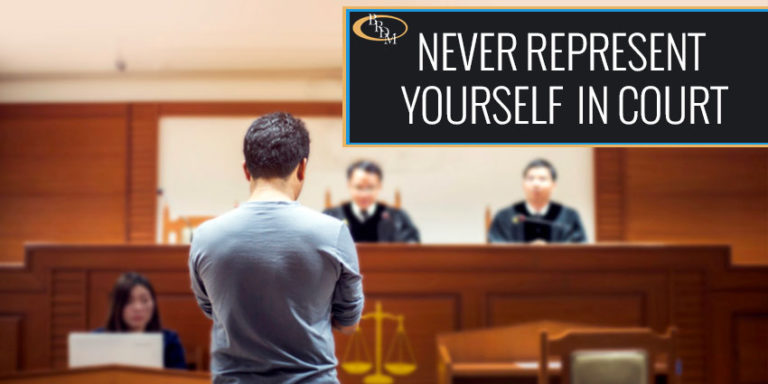Although it’s legal to represent yourself in court, it’s highly unadvised and can be catastrophic in many scenarios. This is especially true in cases where you are defending yourself, as the consequences of a loss can be expensive and life-changing.
One in six Americans self-represent in court every year and, after seeing many cases go badly, we always advise against it. Here are the top reasons why you should never represent yourself in court:
Table of Contents
- You Won’t Have the Legal Knowledge to Succeed
- You Don’t Have the Experience to Compete
- You Can Easily Incriminate Yourself
- You’ll Have an Emotionally Charged Mind.
- You Won’t Know Court Rules
- You Won’t Benefit from Attorney Bias
- You Won’t Have Attorney Resources
- Your Chances of Conviction Are Higher
- You May Have to Pay the Other Party’s Court Fees
- Settlement Outcomes Are Less Satisfying
- Contact an Attorney in Florida
You Won’t Have the Legal Knowledge to Succeed
Those who represent themselves in court tend to overestimate their legal knowledge. Why? Your research isn’t enough. While you might get the basics down, every law has all kinds of loopholes and complexities.
Plus, you’ll be up against someone with extensive professional training and experience. The opposing lawyer or prosecutor will have gone to law school, studied the fine print of every statute and will manipulate your lack of knowledge in their favor.
You Don’t Have the Experience to Compete
Have you ever been in a courtroom? Have you ever stood before a jury or prosecutor with questions fired at you? Because it’s hard at the best of times. Without legal advice, counsel, or support, it’s easy to slip up.
You won’t know the clerk, the bailiffs, the judges or opposing attorneys. In contrast, the other party will have all this experience in their favor. You’ll never have interviewed witnesses, argued motions, followed the rules of evidence, or know when to object or argue. The other party will have.
You can quickly make a fool of yourself in these scenarios and cause the house of cards you’re working with to come tumbling down.
Self-confidence makes no exchange for experience and expertise in a courtroom.
You Can Easily Incriminate Yourself
With that lack of experience and expertise, it can be extremely easy to incriminate yourself accidentally. With an attorney, you’ll speak with your attorney’s help. They’ll know when to step in and object.
Also, a lot of an attorney’s support comes beforehand. They’ll let you know which facts are worth mentioning and which should remain quiet. If you represent yourself in court, you’re more likely to share something you shouldn’t have.
You’ll Have an Emotionally Charged Mind.
Although emotions can have value in a courtroom, it’s not good to look nervous, chaotic and defensive. With it all down to you and you only, emotions can quickly run high and irritate the judge – resulting in a less satisfying case.
You Won’t Know Court Rules
You must know the rules of court. There are no exceptions because you’re representing yourself. You cannot ask for guidance or assistance mid-trial. The judge must remain impartial at all times; losing patience with any incompetence can be catastrophic. Court clerks are also not allowed to give you legal advice.
In most cases, a judge will explain your rights to you and even encourage you to use an experienced lawyer, especially if the consequences include jail time or life-changing penalties.
You Won’t Benefit from Attorney Bias
Bias is prohibited in the court system. But unconscious bias and preferences from judges, prosecutors and juries to attorneys exist.
For example, if you use an attorney with a strong reputation in the local court system and with a good relationship with the judge, then it’s natural that your case has a better chance.
If you go at it alone, you lose any chance of that benefit.
You Won’t Have Attorney Resources
OK, so you think you’ve got what it takes to fight for yourself in a courtroom? But do you have the means and resources to gather the relevant facts and evidence? In comparison to an attorney, the answer is going to be no.
Reputable attorneys work for law firms. These law firms have a lot of connections and wealth to build a rock-solid case on your behalf.
They’ll hire and contact specialists, doctors, analysts and more to prove your case. In some cases, like DUIs, they can even contact the right people minutes after your arrest to get evidence thrown out or proven as invalid.
Your Chances of Conviction Are Higher
The chances of getting convicted are significantly higher when you present yourself in court. It’s simply not worth the risk.
A conviction may result in you paying expensive fines, losing your driver’s license or even jail time. The knock-on effects are far-reaching – from employment and housing to child custody and your reputation.
When the choice is between saving some money and facing years behind bars, it’s never worth the risk.
Our criminal defense lawyers welcome anyone facing a criminal charge to contact us today for a free consultation.
Read Related: How a Criminal Defense Attorney Can Help You
You May Have to Pay the Other Party’s Court Fees
If you lose your case, the judge may order you to pay for the other party’s court and attorney fees. That can be a lot of money! Again, is it worth it? No.
Settlement Outcomes Are Less Satisfying
Attorneys are also pivotal in civil cases that involve settlements. Negotiating is a fine art that attorneys are well versed at. Whether you’re defending your business or making a personal injury claim, you’ll want a lawyer on your side if it goes to court.
This is especially true if you’re up against a big company or insurers that employ brutal lawyers who are experts at minimizing payouts.
Read Related: Common Types of Business Litigation
Contact an Attorney in Florida
If you need an attorney in Florida, please contact us today for a free consultation.
We have top-rated and experienced litigation lawyers, criminal defense attorneys, business lawyers, property damage lawyers and more.
We strongly recommend you never represent yourself in court, it is never worth it.
Free Consultations
U.S. News and World ReportsTier 1 Law Firm, Battaglia, Ross, Dicus & McQuaid, P.A., has extensive experience in the business world; we welcome you to contact us with a free consultation.



